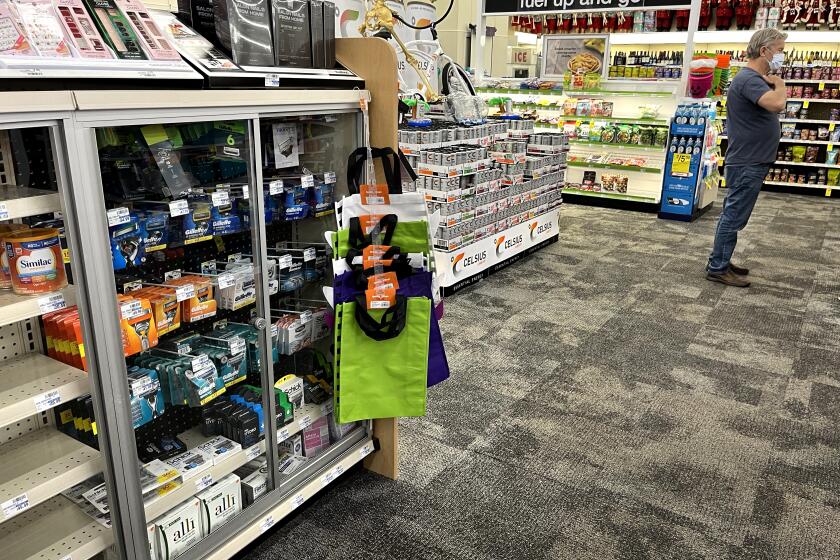‘Theft is an act of desperation’: Pushback remains as Legislature rushes retail theft bills to Newsom
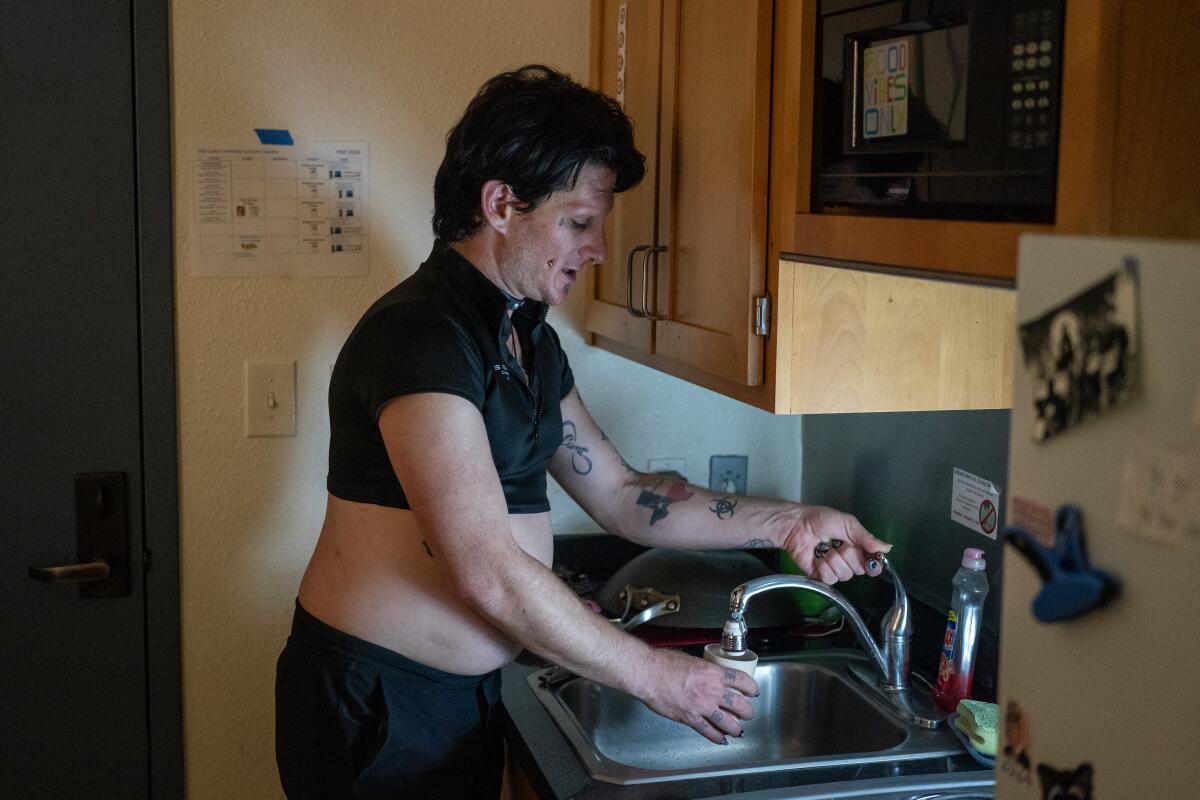
- Share via
SAN FRANCISCO — After coming out as gay at 14 years old, Nicholas Michael Nelson was kicked out of the family home in Oceanside and spent the next twenty years struggling with homelessness and drug addiction.
Nelson, who is nonbinary and goes by the name “Poodle,” moved to San Francisco last year and turned to shoplifting to survive in a town that’s pricey even for the well-to-do.
“I wasn’t ready to fly a sign,” said Poodle, referencing a term that is slang for panhandling. “It’s degrading.”
Still struggling with drugs, such as fentanyl, but living in a subsidized apartment and no longer going hungry, Poodle in December decided to stop stealing once and for all.
Lawmakers have spent all year working on an ambitious package to crack down on retail theft. They have been outspoken about not wanting to criminalize the poorest and most desperate Californians if they steal necessities such as food while also making sure store owners and communities feel protected from these crimes. Poodle exemplifies the complexity of the issue: They represent someone who has both stolen out of need and has also been a part of organized theft rings.
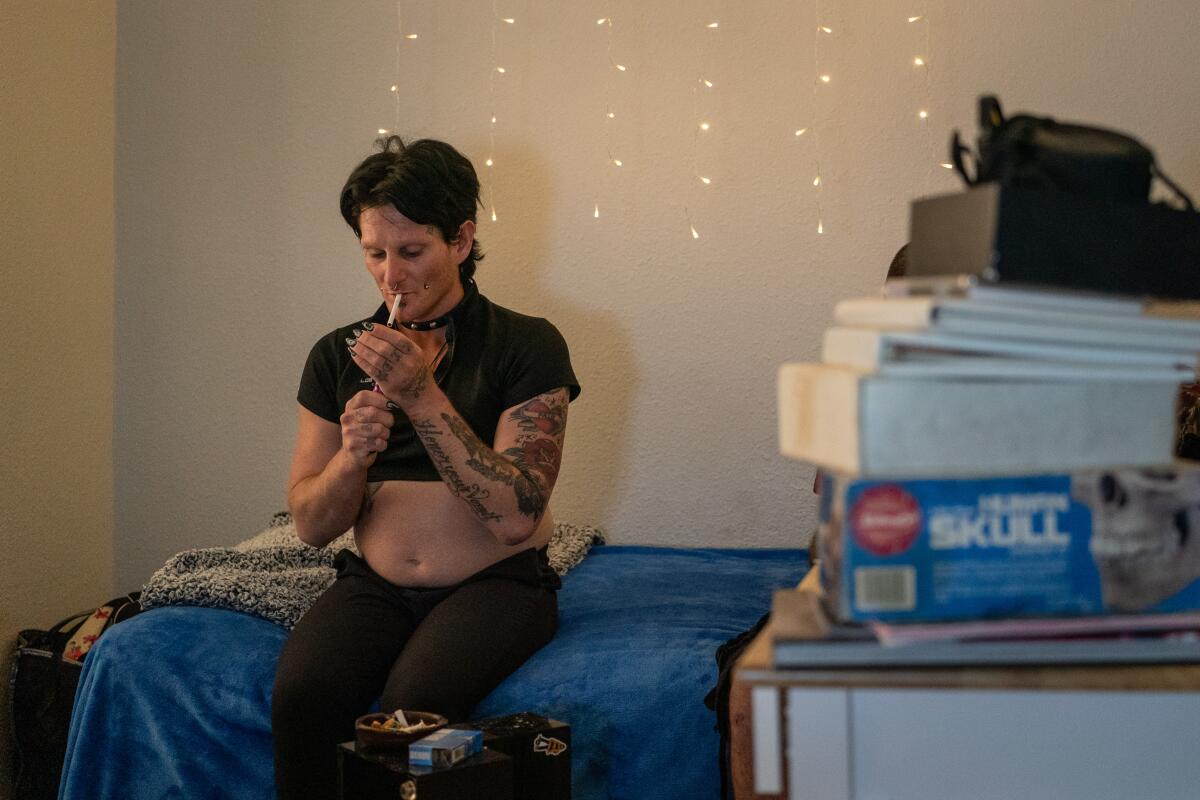
The Democratic-led Legislature is expected to pass a bipartisan 13-bill crime package that will head to Gov. Gavin Newsom for consideration. The legislation would enact some harsher criminal penalties for repeat thieves, give store owners the chance to file for restraining orders against repeat offenders and provide prosecutors with better tools to prosecute car break-ins and multiple thefts that take place across counties. If signed into law, the bills will immediately be put into effect.
Some Democrats have been steadfast in creating tougher criminal penalties for those who are part of organized theft operations, but are hesitant to cast their votes on some legislation that could send those in desperate need to jail for stealing out of necessity.
“You’re hungry! We all know what it’s like when we’re just a little hungry,” said Assemblymember Lori Wilson (D-Suisun City), who sits on the Assembly Public Safety Committee. “When you are hungry and you are desperate, you make desperate decisions.”
A measure to impose harsher penalties for drug possession and theft, altering the controversial Prop. 47 passed in 2014, has qualified for November’s ballot.
Wilson said food insecurity from her childhood is a feeling she knows all too well. And although desperation is not an excuse to steal, she thinks the law should not forget to “take care of people.”
“As a legislator, it’s like, ‘OK, I can fix that so another kid doesn’t have to end up on the wrong track,” she continued. “I know I’m saving someone.”
Poodle spends some weekdays on the corner of Octavia and Page Streets near the freeway exit clutching a piece of cardboard that reads: “Don’t want to steal. Anything helps.” They figure getting a few bucks a day from friendly pedestrians is better than nothing.
“I got tired of waking up and stealing every day,” Poodle told The Times. They said that things have become “out of control” and agreed that there should be jail time for certain repeat offenses. “I was just so uncomfortable. I knew what I was doing was wrong. I had already done jail time for petty theft with a prior. I fought so hard to get my freedom back, I was so scared of getting it taken away.”
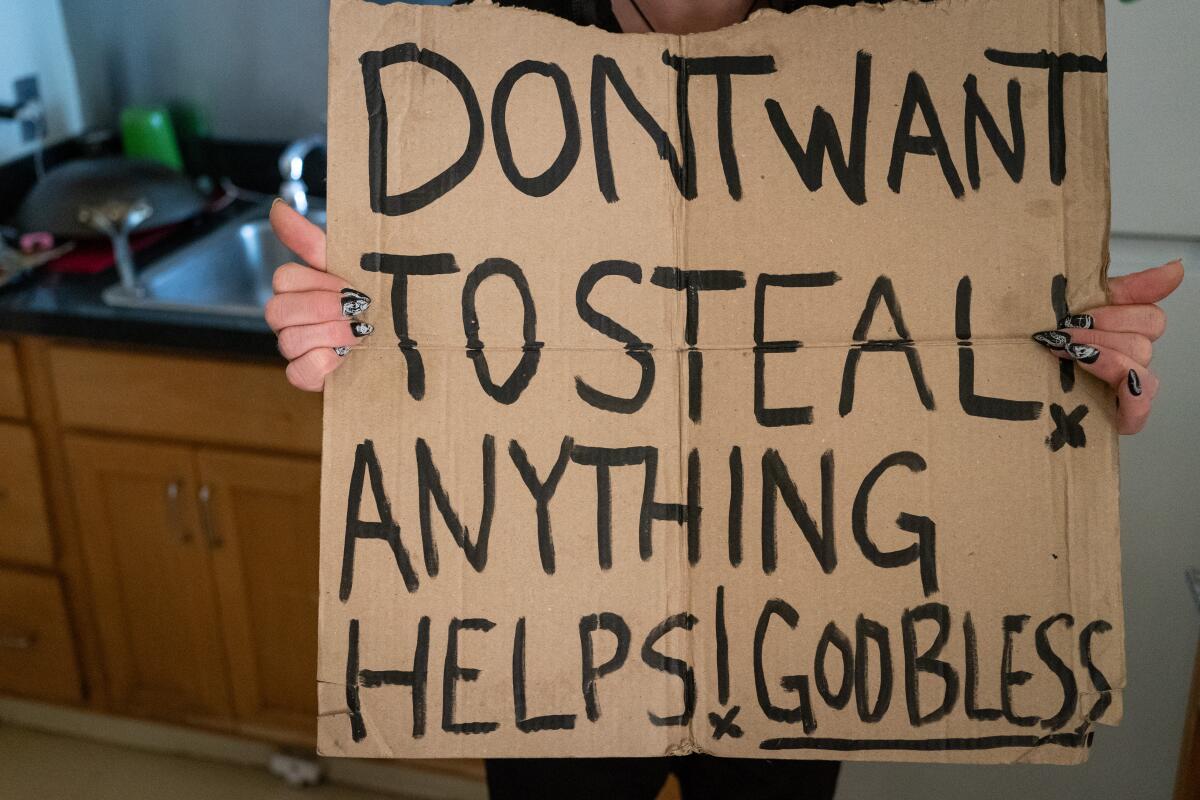
The Legislature’s Democratic leadership wants to resolve the retail theft problem that some argue has been blown out of proportion. Still, lawmakers have been hesitant to pass legislation that hurts the poorest and most marginalized Californians. The bills they have ushered forward address people exactly like Poodle.
Magnus Lofstrom, the policy director of criminal justice at the Public Policy Institute of California and author of widely disseminated research on this issue, knows the nuances involved.
“Part of [the problem] may be driven by people who are poor, lacking opportunities, might be dealing with behavioral health issues, homelessness,” Lofstrom told The Times. “From my perspective, we are seeing symptoms of a social problem.”
In 2014, California voters passed Proposition 47, a ballot measure crafted amid California’s efforts to abide by a federal court mandate to eliminate prison overcrowding. In the decade since, California has been positioned as a leader in criminal justice reform, but after an uptick in property crimes amid the COVID-19 pandemic, many skeptics have blamed the decade-old law for the increase.
California officials must finalize the state budget and the list of measures that will go on the ballot by the end of June. Secret budget conversations are intertwined with deal-making around the 2024 ballot.
A prosecutor-led initiative that could undo parts of Proposition 47 has qualified for the November ballot. Proposition 47 reclassified some felony drug and theft offenses under $950 as misdemeanors. The measure helped reduce jail and prison populations and has saved the state upward of $100 million annually. That money helps fund reentry programs and victim services programs across California.
Earlier this year, Newsom suggested a blueprint of legislation he wanted to crack down on organized retail theft. He has repeatedly emphasized his opposition to changing Proposition 47 through the statewide voter initiative process.
Lawmakers understood the assignment, and at least twenty-seven bills were introduced this year to combat organized retail theft. Thirteen of those bills were bundled into two separate packages brought forward by Assembly Speaker Robert Rivas (D-Hollister) and Senate leader Mike McGuire (D-Healdsburg).
Over months of debates in various legislative committees, some Democrats told The Times that they came across legislation that missed the point.
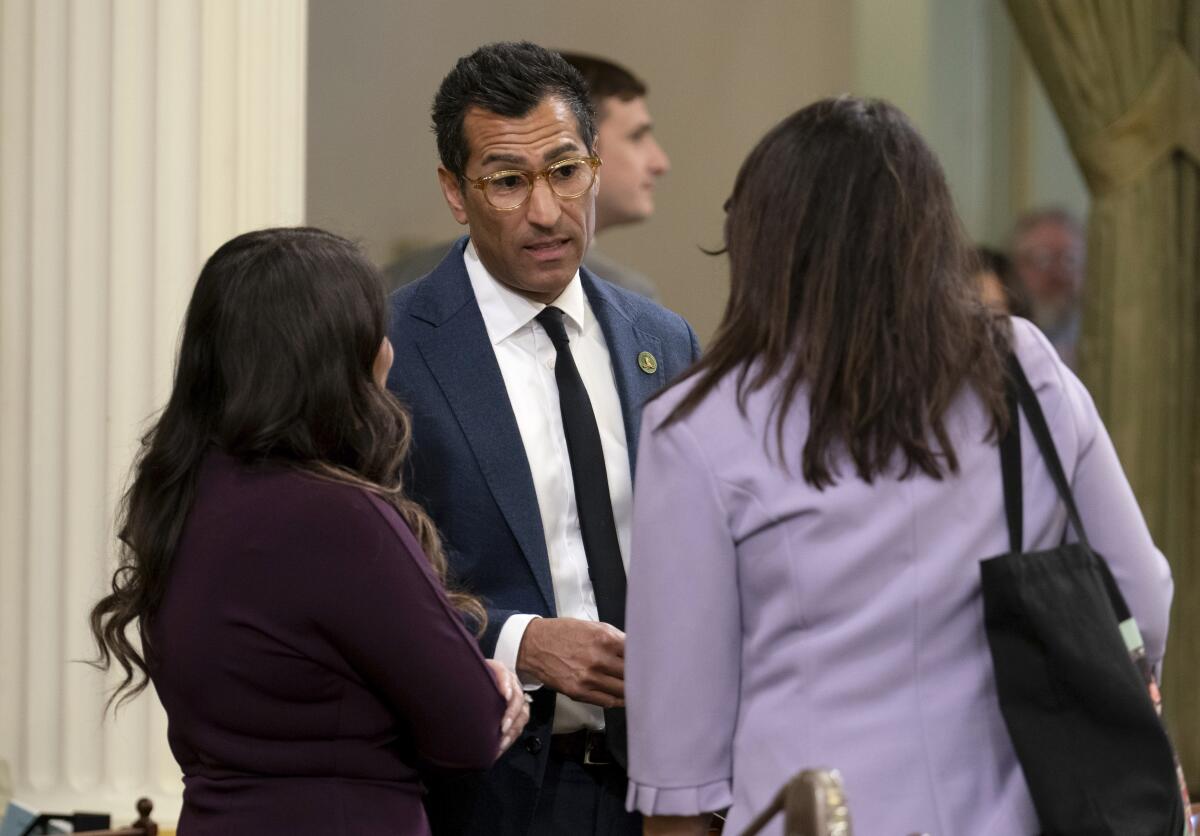
One bill would make it a felony for anyone to coerce a minor into stealing. Democrats pushed back, calling it “overly broad.” Advocates said it would only “criminalize young people” and “overcrowd our jails.” The bill failed in the Assembly Public Safety Committee.
Another would expand the definition of organized retail theft to make it a felony for anyone who acts in concert with another to steal infant formula or baby food. Although some do resell these items on the online marketplace, criminal justice reform advocates pushed back, saying parenthood in California is expensive and questioning whether lawmakers were really going to throw parents into jail for trying to get food for their babies. This bill was pulled by its author.
Last week, a public defender ridiculed one bill allowing prosecutors to charge several offenses across counties and handle them in a single court, arguing that the state needs to address “root causes” of theft and invest in basic needs and housing.
“As a public defender, I know that theft is an act of desperation,” said Sujun Kim, a deputy public defender in San Francisco.
A fourth bill, by Assemblymember Marc Berman (D-Menlo Park), has been considered overly punitive, though it does acknowledge the predicament of many Californians who live in food deserts. It would allow retailers to request restraining orders against people who repeatedly steal. But in weighing a request, the court would have to consider “whether the retail establishment is the only place that sells food, pharmaceuticals, or other basic life necessities within one mile of where the individual resides.”
Assemblymember Juan Alanis (R-Modesto), a former law enforcement officer and co-chair of the Assembly Public Safety Committee, told The Times that communities are becoming retail deserts because businesses affected by theft are closing or leaving town. Alanis supports the ballot initiative to roll back sections of Proposition 47, including making the third theft offense of any amount a felony.
California Democrats plan to pass a package of needed legislation to stem the splurge of retail thefts, from petty shoplifting to professional smash-and-grab robberies. But some in the party cynically intend to insert a “poison pill.”
“What about the person who owns the store? What about their livelihood? That’s how they’re making a living,” Alanis said. “It’s about time we start helping out these small businesses and these families.”
Over the years, research has shown that those who are in poverty and who are food insecure are more likely to commit certain crimes, such as stealing, than those who are not.
“We’re not trying to lock people up for up to three years because they stole food, they were in poverty, or had a child who was hungry,” Berman said. “It is important for the state to address retail theft but we have to be honest with ourselves about why some of this is happening.”
Poodle eventually found the Homeless Youth Alliance, a nonprofit organization that helps youth in the Haight-Ashbury neighborhood. There, they are offered a warm meal, harm reduction courses and a safe community. Because of that organization, they were able to connect with a case worker and get approved for the Single Room Occupancy program, which offers free housing for people struggling to get back on their feet. Poodle now lives in the Tenderloin and said it’s the first housing they’ve lived in since they were a teenager.
Now, at 34, Poodle said they envision a whole new life in San Francisco. They still struggle with drug use, but their volunteer work several days a week keeps them going.
“I feel that I have a job to do here.”
More to Read
Sign up for Essential California
The most important California stories and recommendations in your inbox every morning.
You may occasionally receive promotional content from the Los Angeles Times.


